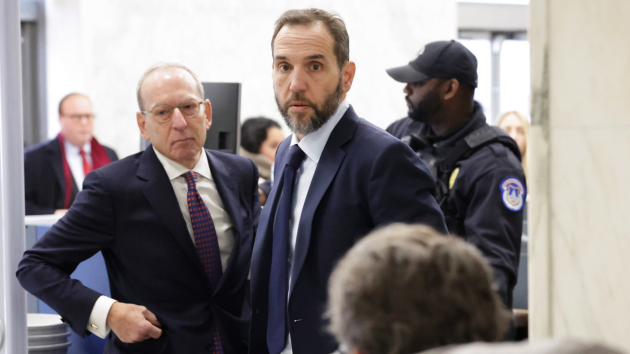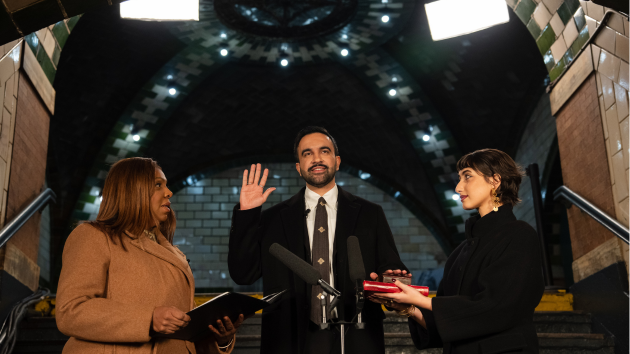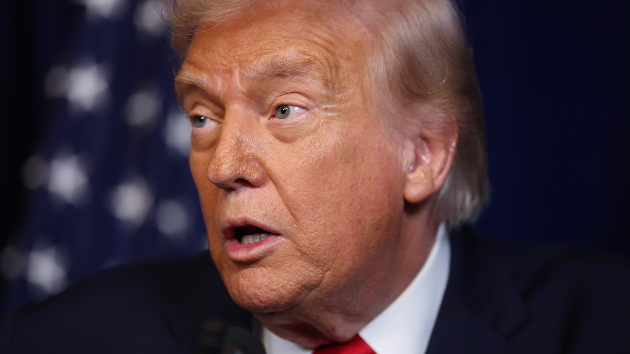Supreme Court to hear Trump’s ‘absolute immunity’ claim. The shape of the presidency is at stake.
Written by ABC Audio ALL RIGHTS RESERVED on April 25, 2024

(WASHINGTON) — Against the backdrop of a divisive 2024 presidential campaign, the U.S. Supreme Court on Thursday will take up the monumental question of whether a former president turned presumptive GOP nominee can be criminally prosecuted for his efforts to stay in power after the last election.
The case, Donald J. Trump v. United States, presents an unprecedented constitutional quandary for the court brought about by equally unprecedented actions by former President Donald Trump in the aftermath of the 2020 presidential election, which he lost to Joe Biden by a margin of 7 million popular votes.
The outcome could determine whether Trump faces a federal trial this year on four felony counts pressed by special counsel Jack Smith, including conspiracy to defraud the U.S. and obstruction of an official proceeding, for his attempts to overturn the electoral vote count certifying Biden’s victory.
Trump, who has pleaded not guilty, is seeking to quash the case on the claim that as a former president he enjoys “absolute immunity” from criminal prosecution for any “official acts” during his tenure. He is the first American president — current or former — to ever face criminal charges.
“The President cannot function, and the Presidency itself cannot retain its vital independence, if the President faces criminal prosecution for official acts once he leaves office,” Trump’s attorneys wrote in their opening brief to the high court.
“Denial of criminal immunity would incapacitate every future President with de facto blackmail and extortion while in office, and condemn him to years of post-office trauma at the hands of political opponents,” they argued.
Two courts have resoundingly rejected the former president’s immunity arguments, including a unanimous three-judge panel of the U.S. Court of Appeals for the District of Columbia.
“Former President Trump has become citizen Trump, with all of the defenses of any other criminal defendant,” the panel wrote. “Former President Trump lacked any lawful discretionary authority to defy federal criminal law and he is answerable in court for his conduct.”
The appeals court warned that if Trump’s constitutional theory were accepted, it would “collapse our system of separated powers” by putting a president above the law.
Smith, the special counsel, argues in his brief to the high court that Trump’s assertion lacks any historical precedent and undermines the founders’ vision of a presidency restrained in power.
“The effective functioning of the presidency does not require that a former president be immune from accountability for these alleged violations of federal criminal law,” the he wrote the justices. “To the contrary, a bedrock principle of our constitutional order is that no person is above the law — including the President.”
A trial date in Smith’s federal election case against Trump was initially set for March 4 in U.S. District Court but was delayed awaiting a final decision by the Supreme Court. A ruling on the immunity claim is expected before July, as soon as mid-May.
The justices could uphold the appeals court decision in its entirety, clearing the way for a trial this summer, or they could take a middle-road approach, spelling out what actions qualify for immunity and which do not, sending the case back to lower courts for further proceedings. Such an outcome could rule out a trial before the November election.
Most legal analysts say it’s highly unlikely the Supreme Court — with its conservative majority and three Trump appointees — will endorse Trump’s sweeping assertion of “absolute immunity.” In a 2020 decision, the same court rejected a similar immunity claim by Trump in his attempt to reject a grand jury subpoena for his tax returns.
A majority of Americans (51%) think the federal indictment of Trump related to Jan. 6 and his efforts to overturn the 2020 election is very serious, according to an ABC News/Ipsos poll from late last year.
Just over half of respondents — 52% — think Trump should have been charged with a crime in this case, while 32% said he should not have been. At the same time, 46% think the charges against Trump are politically motivated, while 40% do not, per the poll conducted using Ipsos’ KnowledgePanel.
Trump’s legal team has argued that the impeachment process is the only check on a president’s conduct allowed by the Constitution, even as they concede that a president who is impeached, convicted and removed from office could subsequently face criminal prosecution for the same acts.
Trump was impeached by the House in 2021 over his efforts to overturn results of the 2020 election but later acquitted by the Senate after he had left office. The former president argues that his actions were part of a legally legitimate effort to ensure election integrity.
Smith insists former presidents have never been immune from prosecution and have always been aware of the potential for prosecution. He cites in court briefs the case of former President Richard Nixon accepting a pardon from President Gerald Ford as evidence that Nixon believed prosecution was possible after he had resigned.
While Supreme Court precedent has limited civil litigation against presidents, the special counsel contends criminal matters are different — and that there are layers of legal safeguards in the system to prevent partisan harassment and protect due process.
Tough new EPA rules would force coal-fired power plants to capture emissions or shut down
“Even if liability could not be premised on official acts,” Smith wrote the justices in his brief, “the case should be remanded for trial, with the district court to make evidentiary and instructional rulings in accordance with this Court’s decision. Petitioner [Trump] could seek appellate review of those rulings, if necessary, following final judgment.”
After oral arguments on Thursday, the justices will vote during their weekly private conference and begin drafting opinions. They are expected to be released before the court’s term ends in June.
Copyright © 2024, ABC Audio. All rights reserved.
 KVSP
KVSP 




